Preview: Brumbies v Hurricanes
Now it is win or bust for a Brumbies team that won just six of their 15 matches and would have finished outside the top eight if it was not for this ridiculous conference system.
However, the facts are that the Brumbies finished the 2017 regular season as the Australian conference champions and their nine defeats include a 21-56 loss to the Hurricanes in Napier in Week Nine.
Despite the glaringly obvious – that the Hurricanes is the far superior outfit – Chris Boyd, coach of the New Zealand franchise, insisted that his squad was preparing for a tough battle in Canberra.
He may just have been courteous.
"The Brumbies are a quality side and we're not reading anything into their results this season," Boyd said.
"They have a proven record in Super Rugby over a long period and will be hard to beat at home."
Overall the Hurricanes have played the Brumbies 23 times with the men from Canberra holding a 13-10 overall win-loss advantage.
The Brumbies hold an eight-against-four win advantage on Canberra.
The two franchises have played twice before in play-off matches with the Brumbies winning 33-20 in Canberra in 1997 and the Hurricanes winning 29-9 in Wellington in 2015.
Brumbies captain Sam Carter says his team is happy to wear the underdogs tag.
The skipper conceded the visitors will head into the match firm favourites, but backed his team to take advantage of it.
"We're more than happy to take the underdog tag," Carter said in an interview on the Brumbies website.
"That's historically what the Brumbies have been over the past 20-odd years and we really enjoy that side of the game."
The Canes head into the finals boasting the best points differential record in Super Rugby with plus 324.
That attacking prowess was on full display earlier in the year when they ran in 56 points against the Brumbies in Napier.
Recent results:
2017: Hurricanes won 56-21, Napier
2016: Brumbies won 52-10, Canberra
2015: Hurricanes won 29-9, Wellington (semifinal)
2014: Brumbies won 29-21, Wellington
2013: Brumbies won 30-23, Canberra

Prediction: The Brumbies have won five of their last seven games against the Hurricanes, although their two defeats in that run came in their last three meetings; they also conceded their equal most ever points against the Wellington side in their most recent clash (56). This will be the third Finals meeting between these teams, with the spoils currently split at one win apiece; the Brumbies earning a 33-20 semifinal win in 1997 before succumbing to the Hurricanes 29-9 in the 2015 semifinals. The Brumbies had won six Finals games in a row on home soil before losing 9-15 against the Highlanders in 2016. The Hurricanes (14.5) have made the most clean breaks per game of any team so far this season, while the Brumbies (6.1) have conceded the fewest per game. The Hurricanes boast the two top try scorers in Super Rugby this season in Vince Aso and Ngani Laumape (14 tries each), while no player has assisted more tries than halfback duo, Beauden Barrett (13) and Thomas Perenara (11). Off course the Brumbies have a chance of winning. However, our money is on a big Hurricanes win – by at least 15 points.
Determining Winners if teams are tied at full-time:
a) Extra Time – the procedure will be:
i) After a five minute rest period, the extra time is played in two 10 minute periods with a two minute half-time;
ii) Before the extra time begins, the match Referee will do a coin toss with the two captains one minute before the new kick-off. The winner of the coin toss decides if his team wants to kick-off or if his team wants to choose the side of the pitch it wants to play on for the first 10 minute period;
iii) For the second 10 minute period, the teams change sides and the team that did not kick off in the first period does so;
iv) Coaches are not permitted on the field during the rest period or half-time.
v) Teams and match officials must remain on the field during the rest period and at half-time.
vi) Injury time is added to the two 10 minute periods.
b) Sudden Death – if the match is still tied at the end of extra time, the procedure will be:
i) An up to 10 minute sudden death period is played after another five minute rest period;
ii) The first team to score (by a penalty, drop-goal or try) will be the winner;
iii) As for extra time, one minute before sudden death begins, the match Referee will do a coin toss to choose which team kicks-off and on which side of the pitch they will play.
iv) Teams and match officials must remain on the field during the rest period.
v) Injury time is added to this period of play.
c) Kicking Competition – if the match is still tied at the end of sudden death, the referee will conduct a place kicking competition to determine the winner of the match, according to the following procedures:
i) All Players and Match officials will remain on the Playing Area. The referee will call the captains of the two teams together and will conduct a coin toss. The winner of the coin toss then may either choose which Team kicks first (in which case the loser chooses the end at which all place kicks will be taken) or choose the end at which all place kicks will be taken (in which case the loser chooses which team kicks first).

Each team must nominate five players to take part in the competition. Only players on the playing area at the final whistle of extra time may be nominated. No substituted players, injury-replaced players or players who have been shown a red card may take part at any time. For clarification purposes, any player who has received a yellow card and who remains in the sin bin at the time of the final whistle of extra time may not take part in the place kick competition (including during ‘sudden death’). The order in which the nominated players will kick does not have to be pre-determined. The match officials and the 10 nominated players (five from each team) will assemble on the half-way line. Team management and players not nominated must remain behind the half-way line in the side of the playing area not used. No one other than the match officials, the match manager, two ball persons and the participating players are allowed in the part of the playing area being used for the competition (including around the playing area, behind the posts, etc).The five players from each team will place kick from three different points, all on the 22 metre line, as follows:
* First point: directly in front of the posts
* Second point: on the 15 metre line on the left hand side facing the posts
* Third point: on the 15 metre line on the right hand side facing the posts. The referee will start the competition by calling the first player selected from the team kicking first to the first kicking point. Once the player has taken the place kick, the referee calls a player from the opposing team to take his place kick from the same point. The next two players (one from each team) will place kick from the second point in turn. This will continue until all five players from each team have place kicked (the next players place kicking respectively from the third point, the first point and finally the second point), or until one team is unable to equal the score of the other team within the remaining number of kicks (at which time the referee will declare the winner).If there are an equal number of successful kicks once each team has completed its five place kicks, the competition continues on a 'sudden death' basis, following the same order of kickers used in the first five kicks. The competition will continue two kickers at a time (one from each team), going progressively through the three kicking points as stated above (and repeating the process if necessary) until one player succeeds with a place kick and the player from the other team taking the same place kick misses it. Once this occurs, the team of the player who succeeded with the place kick will be declared the winner. Each of these additional kicks shall be taken by the same five players in rotation. Throughout the place kicking competition:
* Once a player has positioned the ball on the kicking tee, he must take the kick within one minute. Should he take longer, the referee shall declare the kick unsuccessful.
* After each kick, the referee records the number of the player and whether or not the attempt was successful. The sideline manager/substitution recorder will record the same details on the official match report.
* Whether or not the kick is successful in each case is the sole decision of the referee, who may at his sole discretion rely on the assistance of his assistant referees. The referee’s decision shall be final and binding.
* Once a player has completed their place kick, they shall return to stand with their team behind the half-way line in the side of the playing area not used.
Teams:
Brumbies: 15 Tom Banks, 14 Henry Speight, 13 Tevita Kuridrani, 12 Andrew Smith, 11 James Dargaville, 10 Wharenui Hawera, 9 Joe Powell, 8 Jordan Smiler, 7 Chris Alcock, 6 Scott Fardy, 5 Sam Carter (captain), 4 Rory Arnold, 3 Allan Alaalatoa, 2 Josh Mann-Rea, 1 Scott Sio.
Replacements: 16 Robbie Abel, 17 Ben Alexander, 18 Leslie Leulua'iali'i-Makin, 19 Blake Enever, 20 Jarrad Butler, 21 Tomas Cubelli, 22 Jordan Jackson-Hope, 23 Christian Lealiifano.
Hurricanes: 15 Nehe Milner-Skudder, 14 Wes Goosen, 13 Jordie Barrett, 12 Ngani Laumape, 11 Julian Savea, 10 Beauden Barrett, 9 Thomas Perenara (captain), 8 Brad Shields, 7 Ardie Savea, 6 Vaea Fifita, 5 Sam Lousi, 4 Mark Abbott, 3 Jeff To'omaga-Allen, 2 Ricky Riccitelli, 1 Ben May.
Replacements: 16 Dane Coles, 17 Chris Eves, 18 Loni Uhila, 19 Reed Prinsep, 20 Callum Gibbins, 21 Te Toiroa Tahuriorangi, 22 Otere Black, 23 Cory Jane.
Date: Friday, July 21
Venue: GIO Stadium, Canberra Stadium
Kick-off: 19.35 (21.35 NZ time; 09.35 GMT)
Expected weather: Sunny day with light winds. High of 13°C and a low of -6°C
Referee: Glen Jackson (New Zealand)
Assistant referees: Nic Berry (Australia), William Houston (Australia)
TMO: Ian Smith (Australia)
Compiled by Jan de Koning
@king365ed
@rugby365com
* Statistics provided by Opta Sports & sportguru.info



























